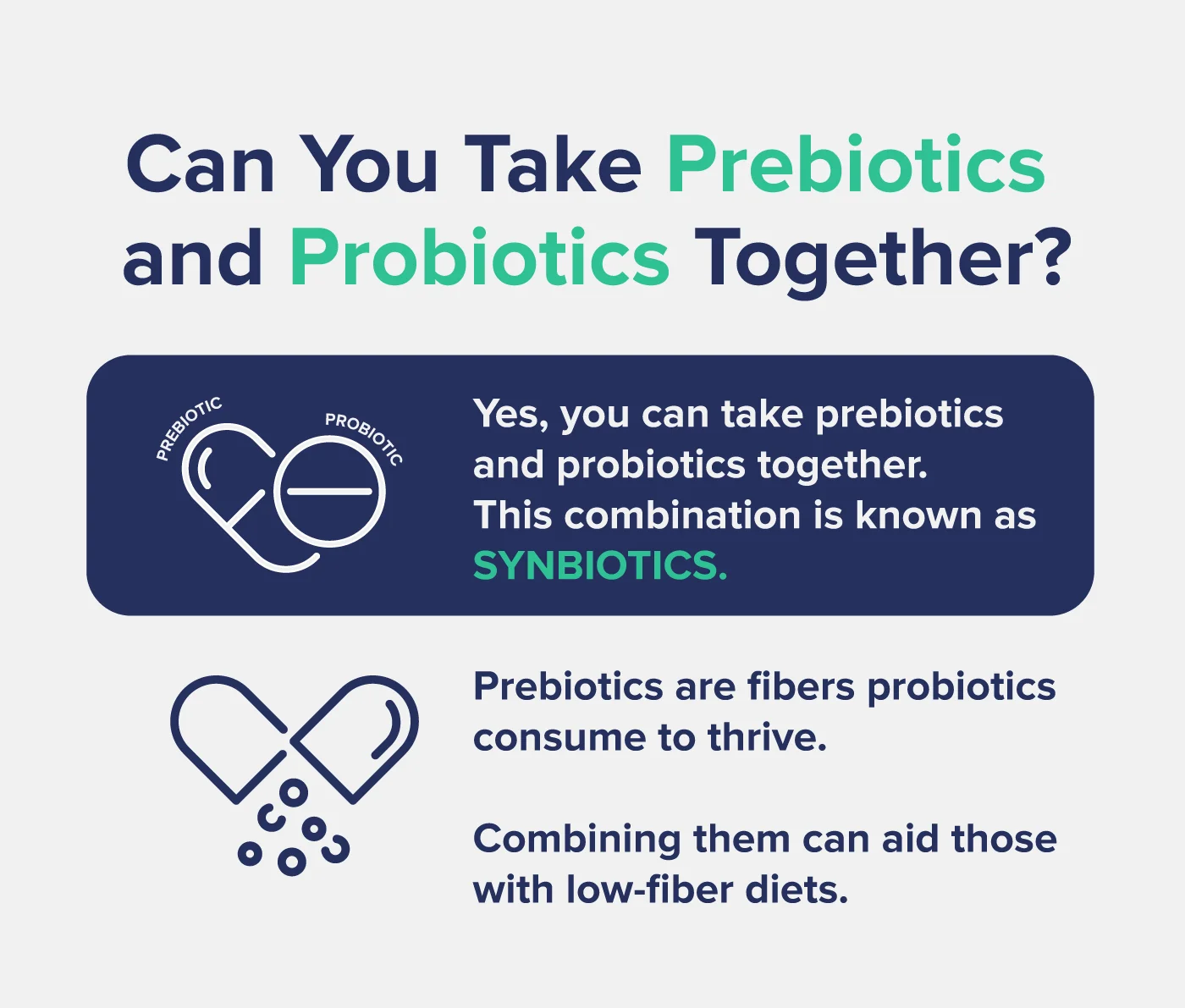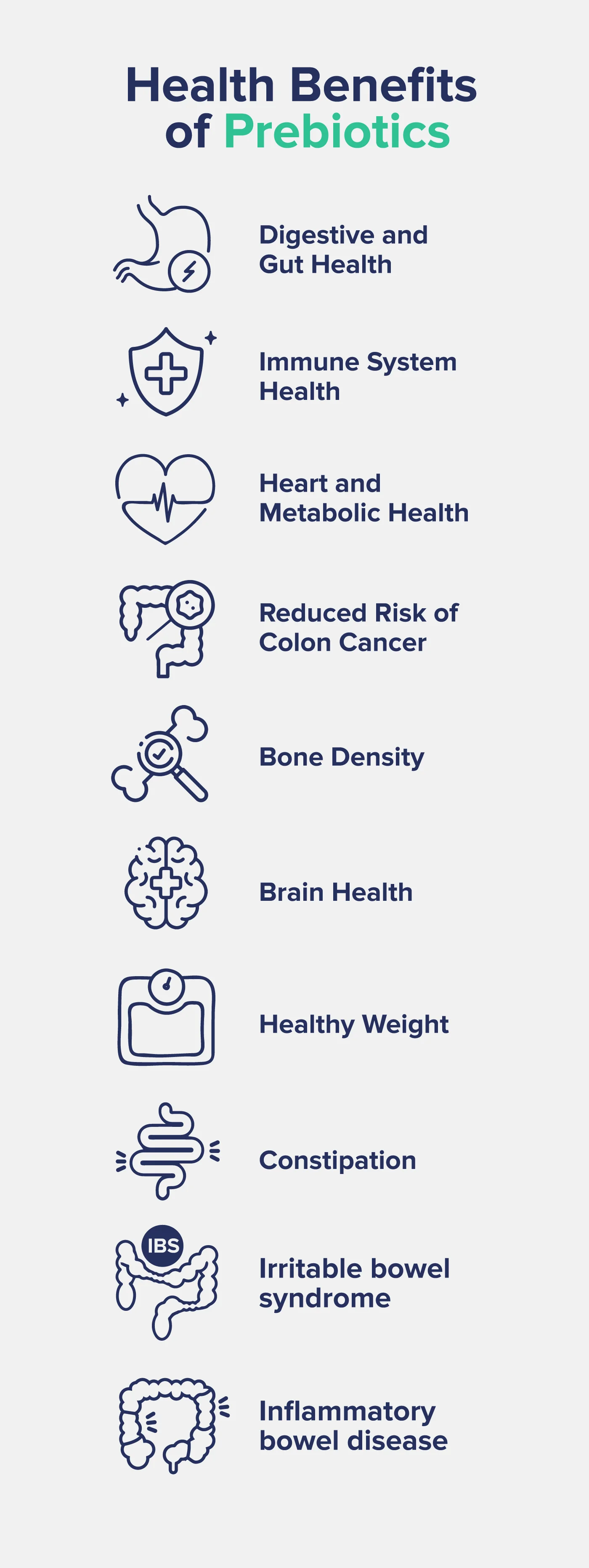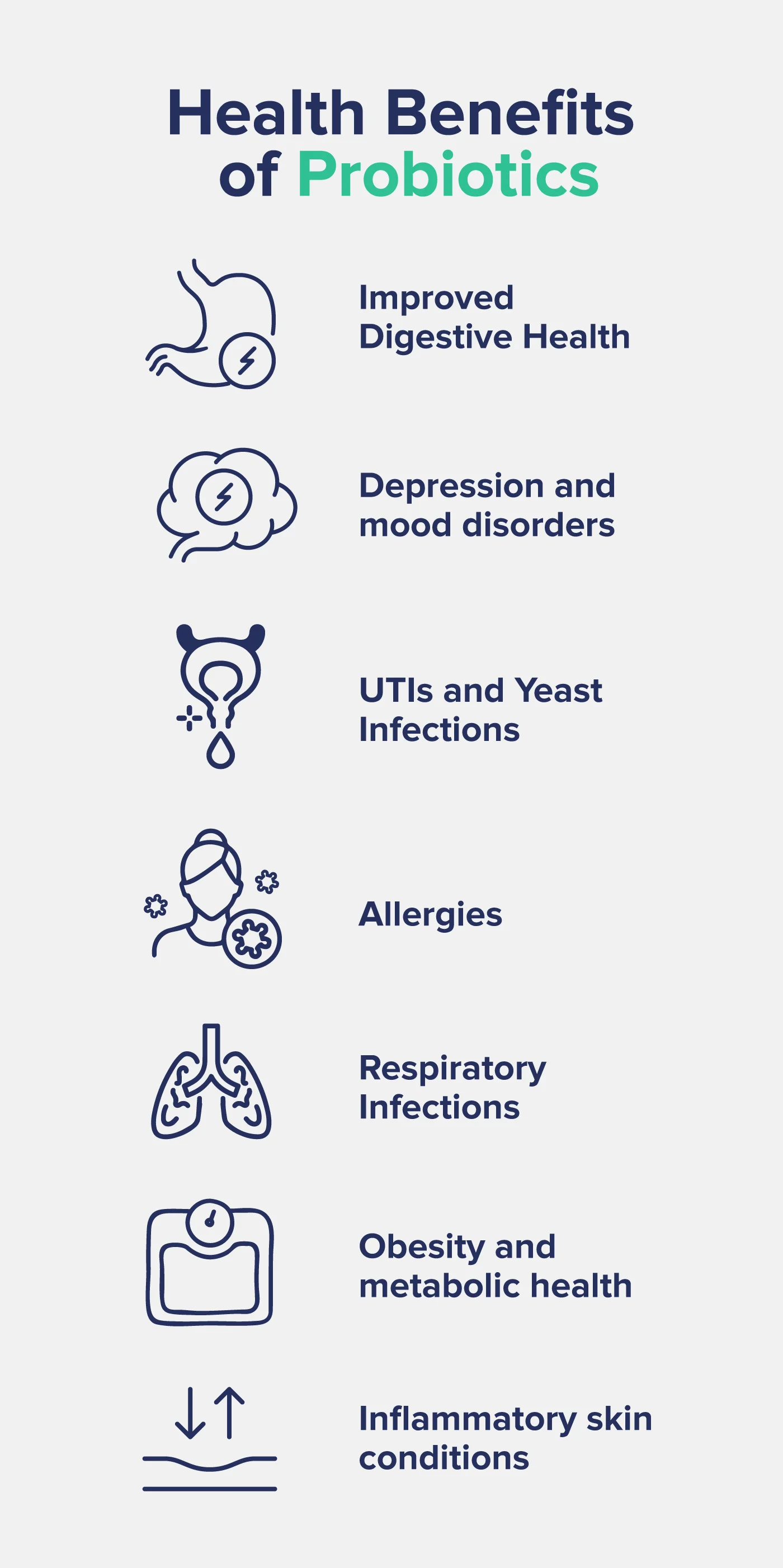Try our favorite, clean protein powder: See our top pick →
Try our favorite, clean protein powder: See our top pick →
This post contains links through which we may earn a small commission should you make a purchase from a brand. This in no way affects our ability to objectively critique the products and brands we review.
Evidence Based Research To fulfill our commitment to bringing our audience accurate and insightful content, our expert writers and medical reviewers rely on carefully curated research.
Read Our Editorial Policy
Although they differ by just one letter, prebiotics and probiotics are entirely dissimilar from one another.
But it’s not a “one-or-the-other” scenario when it comes to supplementing with prebiotics and probiotics; you don’t have to choose—in fact, they can be highly beneficial to take in tandem.
In this article, learn more about whether or not to take prebiotics and probiotics together (the short answer: you probably should!) and the best supplements we’ve found on the market today.
To get right to the point, yes, you can take prebiotics and probiotics together. In fact, there’s a name for this combination: synbiotics.
Taking prebiotics and probiotics at the same time is beneficial because they complement each other. Probiotics are healthy gut bacteria that benefit our gut microbiomes, but they can’t survive without prebiotics.

Prebiotics are a specific type of dietary fiber that probiotic bacteria consume to stay alive and thrive in the gut. In simplest terms, we eat prebiotics, and probiotics eat prebiotics.
Taking prebiotics with your probiotics can be particularly helpful if you don’t eat a high-fiber diet.
Choosing a synbiotic supplement instead of just a probiotic supplement—or using two separate prebiotic and probiotic supplements—can ensure that the beneficial gut bacteria have enough fuel to consume and can survive and thrive in your gut.
Taking a prebiotic with your probiotic can be beneficial because prebiotics are an energy source for probiotics. So, taking them together can help to maximize the synergistic effects of probiotics and prebiotics.
If you don’t take probiotic supplements, you can try eating probiotic-rich foods with your prebiotic supplement to get similar synbiotic effects.
Probiotic foods are fermented foods, including yogurt, kefir, sauerkraut, kimchi, natto, fermented and pickled vegetables, miso, and tempeh.
Conversely, if you don’t take a prebiotic supplement, you can eat prebiotic-rich foods alongside your probiotic. The top prebiotic foods include leeks, garlic, onions, apples, chicory, oats, beans, greener bananas, Jerusalem artichokes, and some whole grains (like wheat bran and barley).
Synbiotics are supplements that combine prebiotics and probiotics. Some of our favorite synbiotic supplements that combine probiotics and prebiotics include:
If you want to take prebiotics or probiotics separately, we also have comprehensive articles with our top picks for each.
A full list of our top-rated prebiotic supplements can be found in the article Best Prebiotics for Gut Health. A few of our favorites include:
If you’re looking for probiotic supplements for men and women, head on over here: Best Probiotics for Men and Best Probiotics for Women.
Prebiotics are unique types of dietary fiber that are not digested or absorbed by our digestive systems.
Rather, they are consumed and fermented by various microbes in the colon (large intestine). When colonic bacteria consume prebiotic fibers, these microbes can grow and thrive in the gut, which benefits the host (us!).
Various gut bacteria use carbohydrate-hydrolyzing enzymes to break down and ferment prebiotic fibers, producing hydrogen, methane, carbon dioxide, lactate, and short-chain fatty acids.
In turn, these fermentation byproducts (also known as metabolites) provide energy for certain healthy gut flora to use, allowing them to continue living and growing in the colon. Primarily, the breakdown of prebiotic fibers stimulates the growth of Bifidobacterium, a good bacteria genus known to improve gut health.

While prebiotic supplements exist, these fibers are also found in many plant foods, including leeks, asparagus, chicory, less-ripe bananas, Jerusalem artichokes, garlic, onions, wheat, oats, and beans.
The types of prebiotic compounds found in these foods include resistant starch, pectins, gums, non-digestible oligosaccharides, and sugar alcohols.
In supplement form, you may see prebiotics on labels as galactooligosaccharides (GOS), transgalactooligosaccharides (TOS), polydextrose, wheat dextrin, acacia gum, psyllium, potato starch, glucomannan, or inulin.
There are two primary mechanisms by which prebiotics are thought to support gut health (and overall health):
Because of these reasons, the health benefits of prebiotics include:
For more information and a deeper dive into the research, head over to these articles: What Are Prebiotics and The Benefits of Prebiotics.
Probiotics are live microorganisms that can benefit the host they live in—which is us!
Our guts contain trillions of bacteria—including helpful, harmful, and neutral bugs—that constantly compete for space. Therefore, adding probiotics to your diet or supplement regimen can help crowd out the pathogenic gut bacteria and allow beneficial bugs to take hold.
When our gut microbiota populations become out of whack, dysbiosis—an imbalance of good and bad bacteria—can develop. Dysbiosis is a common cause of health problems, both digestive and non-digestive, so repopulating your gut microbiome with beneficial bacteria can help correct this imbalance.

Dysbiosis can also include low microbial diversity. Microbial diversity is essential because various bacterial species do different things, ranging from digesting fiber to producing vitamins and metabolites to modulating immune system function.
Probiotics have many potential health benefits when used as a dietary supplement. They can reduce dysbiosis in the gut microbiome—too many harmful bacteria without enough beneficial bacteria—and promote a healthy balance of gut flora.
Although it can vary individually, probiotics may benefit:
For more information, pop over to this in-depth article about the Benefits of Probiotics.
Some people avoid prebiotics because they can worsen their digestive symptoms. This is because prebiotics are a type of fermentable fiber, meaning they can produce gas in the digestive tract and cause uncomfortable symptoms like bloating or abdominal pain.
Most prebiotics are high in FODMAPs (fermentable oligosaccharides, disaccharides, monosaccharides, and polyols), which some people experience digestive problems with after eating.
People with digestive disorders (like IBS and IBD) may or may not experience negative side effects from prebiotics—it seems to be a case-by-case basis. If you’re not sure whether to take prebiotics or probiotics, you can always speak with your healthcare provider.
You can take prebiotic and probiotic supplements at the same time. If you don’t remember to take them at the same time, it’s likely fine to take them at separate times of the day.
Research on prebiotics does not typically assess timing. Unlike probiotics, where there are more studies on the topic of supplement timing, we don’t yet have the same information on prebiotics. Therefore, the “best time of day to take prebiotics” is based on anecdotal evidence and theories about digestive health and function. If you are taking prebiotics to help with constipation, you may want to take them in the morning to “jumpstart” your digestion and hopefully help you get things moving along in your gut.
As there is no evidence-based research on when to take prebiotics, it may take some trial and error to see what time of day works best for you, your digestion, and your routine. Overall, the best time of day to take prebiotics is when you will consistently remember to take them.
Regarding probiotics, some research suggests that taking probiotics on an empty stomach or with a small bit of food is best. But, like with prebiotics, it matters most that you take your probiotics at a time you can reliably remember, as consistency is key.
If you take a high-quality probiotic supplement every day, you might experience beneficial effects on your digestive system. Some other potential benefits of probiotics include improved immune system function, skin health, mental health, and heart health. However, the results can vary widely depending on the certain probiotic strains you take and your overall health status. Sometimes, people can have digestive symptoms when starting a probiotic—especially if their microbiome is scant with healthy bacteria.
Similarly, when you first start taking a prebiotic, you may experience some initial digestive discomfort if your body is not used to consuming a lot of fiber. Typically, this resolves within a few days. Over time, taking probiotic and prebiotic supplements consistenly should improve digestion and any gastrointestinal-related symptoms.
Yes, it can be beneficial to take prebiotics and probiotics together. This combination is called a “synbiotic,” as these two supplements work synergistically to benefit a healthy microbiome. Probiotics are beneficial bacteria that populate the gut, while prebiotics are the fuel that probiotics consume to stay alive and thrive in the gut.
Subscribe now and never miss anything about the topics important to you and your health.